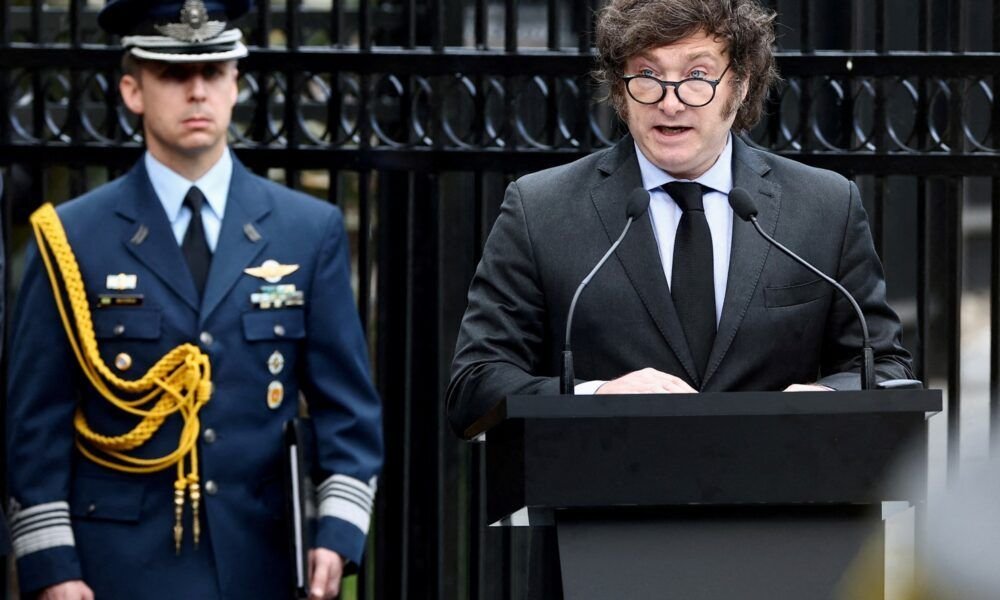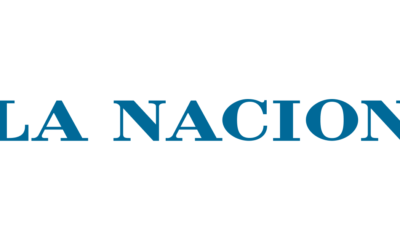


¿Cómo te ves de acá a diez años? En sus días universitarios, en plena época de entrevistas laborales, la pregunta llegaba a los oídos de Daniela...



Javier Milei reconoció este miércoles como subtenientes de reserva a los soldados aspirantes oficiales de reserva (AOR) que combatieron en Malvinas y que hasta el momento...



En la era del reciclaje y la decoración consciente, un elemento inesperado se convirtió en protagonista: las cajas de fruta y verdura. Estos elementos de madera...



Un informe del Observatorio Pyme reveló también que el 40% de las pequeñas y medianas empresas manufactureras perciben una amenaza creciente 01/04/2025 – 17:22hs Un reciente...



Toti Ciliberto fue uno de los humoristas que alcanzó la fama con VideoMatch, aquel programa que llevó al estrellato a Marcelo Tinelli y muchos otros. Salvador...



OpenAI ha anunciado este martes que su nueva herramienta Imagen está ya disponible para todos sus usuarios, no solo los suscriptores de pago. Una semana después...



El suizo Sepp Blatter, expresidente de la FIFA, y el francés Michel Platini, expresidente de la UEFA, fueron absueltos una vez más en el caso de...



Santiago Fidanza destacó que «se han retomado niveles de normalidad en la vida de las personas, lo cual es muy positivo», y subrayó que desde el...



Después que ocho millones de telespectadores la escucharon el lunes a la noche en televisión, Marine Le Pen no solo decidió apelar la sentencia que la...



A 43 años del comienzo de la Guerra de Malvinas, la Oficina del Presidente de la Nación emitió un comunicado en el que reivindicó el reclamo...



China’s military launched large-scale drills around Taiwan Tuesday to send a «severe warning» and a message of «forceful containment against Taiwan independence,» Beijing officials said. Taiwan’s Ministry...



La recaudación creció un 10% en términos reales y alcanzó los $12,7 billones, pese al fin del Impuesto PAIS y la baja de retenciones 01/04/2025 –...



El martes 1 de abril salieron a la luz chats y audios de Morena Rial, en donde confiesa que formaba parte de una banda delictiva y...



Cómo usar estos objetos para decorar este espacio y a la vez darles usos útiles La entrada Seis ideas para reutilizar cajas de frutas y verduras...



El presidente Javier Milei y el ministro de Economía, Luis Caputo, viajarán a Estados Unidos en las próximas horas en un contexto de negociaciones con el...



¿Cuánto poder es necesario para llevar adelante las reformas estructurales que el país requiere? Una pregunta imprescindible a la que se suma otra que se encuentra...



En las últimas horas se hizo viral en las redes sociales un video del pasado fin de semana que deja a las claras la omnipresencia de...



Antes de que la Corte Suprema termine de una buena vez de condenar a Cristina Kirchner por administración fraudulenta del Estado para que vaya presa y...



El legislador porteño Ramiro Marra lanzó una polémica propuesta en el marco de su campaña electoral en la Ciudad de Buenos Aires. Marra adelantó que buscará...



El Senado de la Nación tiene previsto tratar mañana los pliegos de Ariel Lijo y Manuel García-Mansilla, propuestos por el Poder Ejecutivo Nacional para integrar la...



La Selección de Brasil se encuentra acéfala tras la destitución de Dorival Junior, el segundo técnico consecutivo que eyecta La Scaloneta a raíz de la última...



html{box-sizing:border-box;-webkit-text-size-adjust:100%;word-break:normal;-moz-tab-size:4;-o-tab-size:4;tab-size:4}*,:after,:before{background-repeat:no-repeat;box-sizing:inherit}:after,:before{text-decoration:inherit;vertical-align:inherit}*{padding:0;margin:0}hr{overflow:visible;height:0;color:inherit}details,main{display:block}summary{display:list-item}small{font-size:80%}[hidden]{display:none}abbrMisión: recuperar Malvinas. Secretos del Día D, una operación exitosa que terminó en improvisación y desastre{border-bottom:none;text-decoration:underline;-webkit-text-decoration:underline dotted;text-decoration:underline dotted}a{background-color:transparent}a:active,a:hover{outline-width:0}code,kbd,pre,samp{font-family:monospace,monospace}pre{font-size:1em}b,strong{font-weight:bolder}sub,sup{font-size:75%;line-height:0;position:relative;vertical-align:baseline}sub{bottom:-.25em}sup{top:-.5em}table{border-color:inherit;text-indent:0}input{border-radius:0}[disabled]{cursor:default}[type=number]::-webkit-inner-spin-button,[type=number]::-webkit-outer-spin-button{height:auto}[type=search]{-webkit-appearance:textfield;outline-offset:-2px}[type=search]::-webkit-search-decoration{-webkit-appearance:none}textarea{overflow:auto;resize:vertical}button,input,optgroup,select,textarea{font:inherit}optgroup{font-weight:700}button{overflow:visible}button,select{text-transform:none}[role=button],[type=button],[type=reset],[type=submit],button{cursor:pointer;color:inherit}[type=button]::-moz-focus-inner,[type=reset]::-moz-focus-inner,[type=submit]::-moz-focus-inner,button::-moz-focus-inner{border-style:none;padding:0}[type=button]::-moz-focus-inner,[type=reset]::-moz-focus-inner,[type=submit]::-moz-focus-inner,button:-moz-focusring{outline:1px dotted ButtonText}[type=reset],[type=submit],button,html [type=button]{-webkit-appearance:button}button,input,select,textarea{background-color:transparent;border-style:none}a:focus,button:focus,input:focus,select:focus,textarea:focus{outline-width:0}select{-moz-appearance:none;-webkit-appearance:none}select::-ms-expand{display:none}select::-ms-value{color:currentColor}legend{border:0;color:inherit;display:table;white-space:normal;max-width:100%}::-webkit-file-upload-button{-webkit-appearance:button;color:inherit;font:inherit}img{border-style:none}progress{vertical-align:baseline}[aria-busy=true]{cursor:progress}[aria-controls]{cursor:pointer}[aria-disabled=true]{cursor:default}html{–suecaslabextrabold:suecaslabextrabold,Georgia,»Times New Roman»,Times,serif;–suecaslabbold:suecaslabbold,Georgia;–suecaslabsemibold:suecaslabsemibold,Georgia,»Times New Roman»,Times,serif;–suecaslabheavy:suecaslabheavy,Georgia,»Times New...



Independiente cayó en su regreso al plano internacional: el equipo de Julio Vaccari perdió en la altura de Potosí en el debut del Grupo A de la...



Recientes hechos dan cuenta de que, en la Argentina, la violencia y los negocios espurios se suelen mezclar con lo peor del fútbol y del sindicalismo....



El exdiputado provincial Germán Kiczka declaró en el juicio en su contra y aseguró que la causa responde a una “persecución política”. En el mismo proceso...



Feriados El exceso de feriados que tenemos en nuestro país atenta directamente contra la producción nacional. Cuando atravesamos una semana “normal” estamos cerca de una con...



Desde el inicio de la presencia humana en la Tierra se registra un crecimiento de la población. También se ha registrado un crecimiento más acelerado de...



Presentación deluxe del campeón de la última Copa Sudamericana en la Copa Libertadores 2025: Racing goleó 3-0 a Fortaleza en Brasil por la primera fecha del...



El quiebre de las negociaciones entre los sectores en pugna del peronismo por el calendario electoral en la provincia de Buenos Aires abrió el escenario para...



La Academia debutó con victoria. Foto: EFE La Academia debuta en la...



El reconocido economista Ricardo Arriazu, en una presentación en la provincia de Córdoba organizada por S&C Inversiones SA, dio su pronóstico sobre la situación actual del...



Así es, Among Us sigue confirmando más actualizaciones. Ya tenemos detalles interesantes sobre sus planes para este año 2025 y ahora hay más información. Esta actualización de novedades ha sido bien...



Una carta de la embajada estadounidense en Europa horroriza a las empresas porque amenaza contra las medidas a favor de la DEI o políticas de inclusión....



En un mercado inmobiliario en el que la vuelta del crédito hipotecario ilusiona a todos los que están pensando en poder comprar su casa propia, existen...



Horóscopo chino para la Rata: es momento de dejar los temores de lado y tomar las riendas de tu vida. Deja de pensar en lo que los...



En un contexto donde la educación pública enfrenta numerosos desafíos, el Municipio de Morón ha lanzado una nueva edición del Programa Acompañar Morón, una iniciativa destinada...



Iranian military commanders are considering a preemptive strike on a joint U.S.-U.K. base on the Chagos Island located in the Indian Ocean in an apparent attempt...



El llamado «Día de la Liberación» arancelaria proclamado por Donald Trump para este miércoles, mantiene en vilo al mundo entero. Mientras los países evalúan estrategias para...



La icónica conductora Mirtha Legrand fue homenajeada en el Auditorio Nacional, donde recibió el reconocimiento como Personalidad Destacada de la Cultura. El evento, organizado por la...



01/04/2025 22:14hs. Actualizado al 01/04/2025 22:24hs. Se separó de la marca. Olfateó que ese cabezazo flotado de Sosa podía caer detrás del central. Jugó con el...